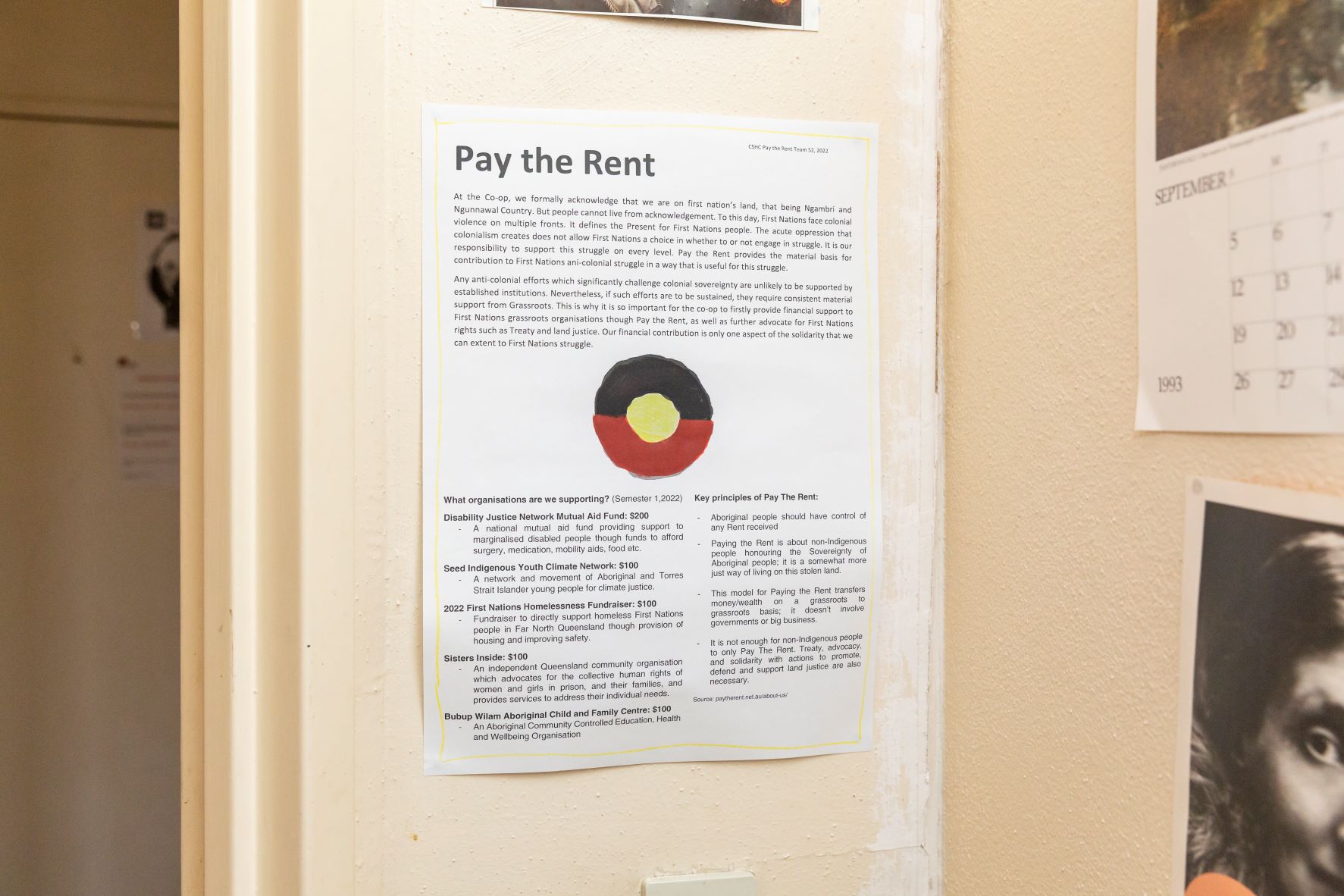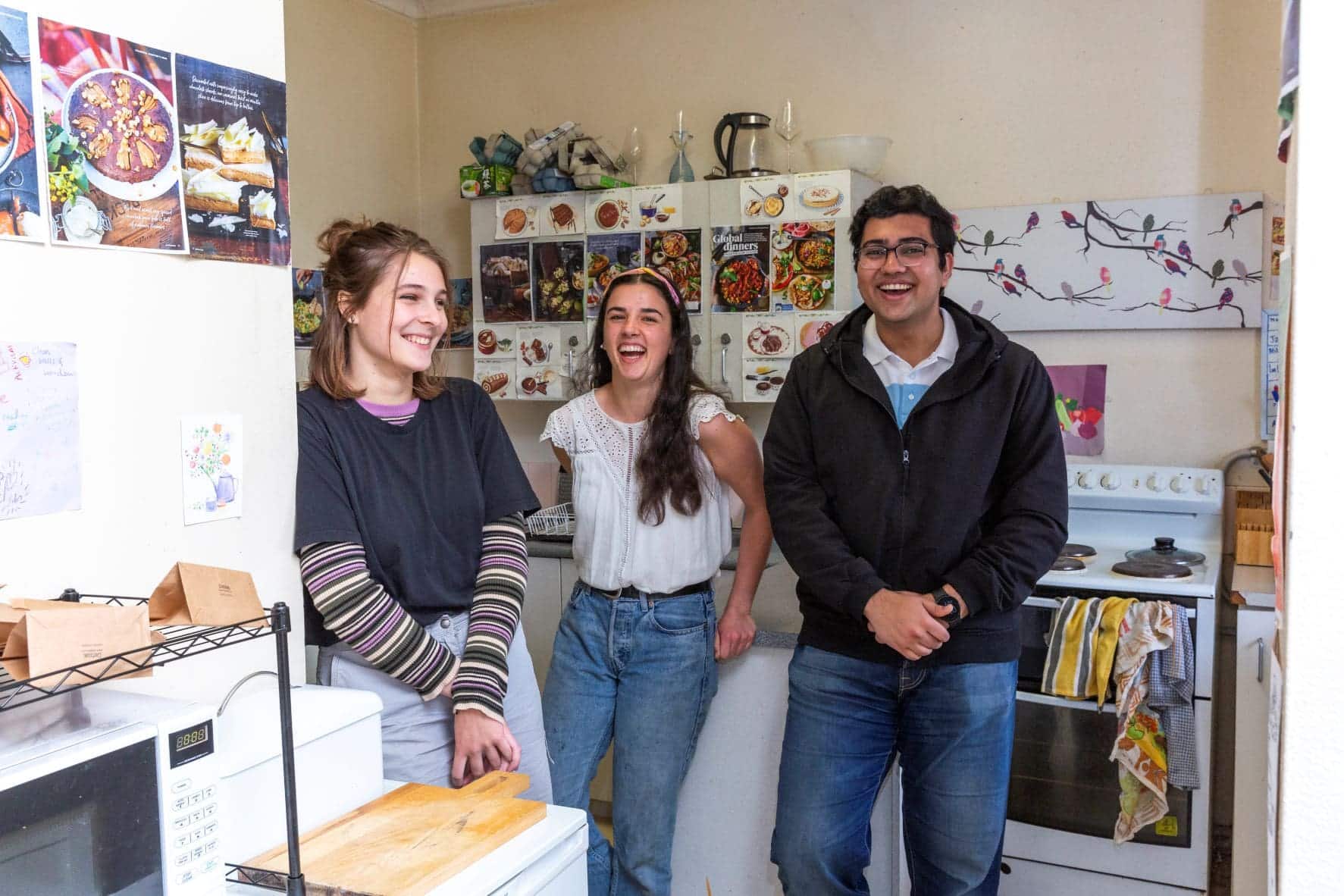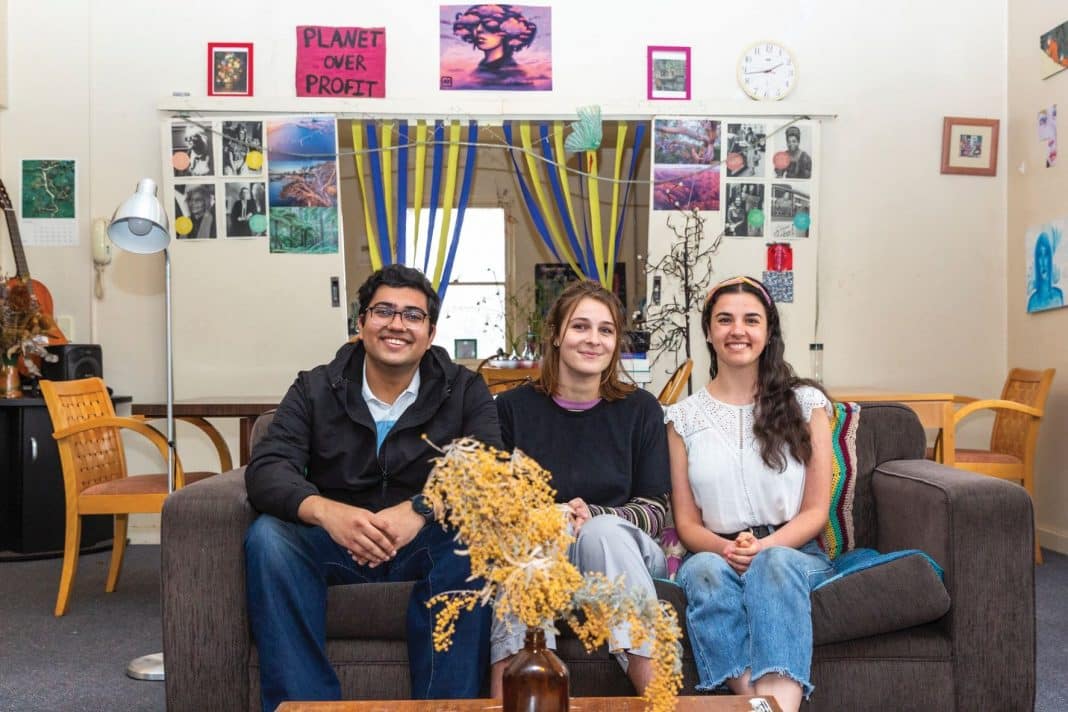Carrying the torch of the many students who have come before them, the Canberra Student Housing Co-operative advocates for affordable housing across the ACT while preaching socialistic ideologies and rebelling against individualistic norms.
Established in 2010, the Student Co-op is designed to ease the rental crisis in Canberra by providing students with secure, affordable, and quality housing based on the co-operative model.
Living in five dorm-like units in an extension of Havelock House, an ACT social housing organisation, the Co-op governs itself and shares the household responsibilities, fosters personal expression, and believes students can be part of the housing crisis solution.
They hesitate to place themselves within the realm of a commune, but are a collective group of people contributing towards a household and preaching common goals.
The Co-op was formed based on the Rochdale model founded in the 1840s as a means of ensuring mutual support for artisans during the industrial revolution.
Through a collective community, the artisans were able to build a network to support one another based on seven main principles: inclusive membership, democracy, autonomy, economic participation, education, co-operation, and community concern.
From 1844 in the United Kingdom to 2022 in Canberra, the university students have adopted the Rochdale principles and use them as a launching pad to create their own unique structure that goes against the grain of mainstream society.
The latest Rental Affordability Index showed Canberran student sharehouses are the most unaffordable in the country, with rent as a share of income at up to 40 per cent. To be deemed not in rental stress, your rent should be no more than one third of your income.
Students at the Co-op pay $180 per week for their rooms, which is significantly lower than the $260 charged by the next cheapest university accommodation in Canberra, says the group.
A Co-op resident since January 2022, Lucaya Rich, 21, doesn’t know what she would have done if she hadn’t been accepted as a resident considering Canberra’s expensive university accommodation.
“Like for me, that’s a massive red flag from the uni’s point of view, in terms of how are students expected to support themselves and be able to study viably, and a kind of huge barrier to entry for anyone from a lower or even a middle socioeconomic background,” says Lucaya.
“I don’t think price should be a determinant of whether or not you’re able to pursue your educational goals.
“We’ve looked at partnering up with ANU previously and have developed proposals to take over buildings on campus to run as a co-operative but for various administrative reasons, that hasn’t gone ahead. The kind of main one was that they want us to run it not as a co-operative, which kind of wasn’t going to work.”

Another Co-op resident, 20-year-old Eloise Saint-Girons is from France and was studying in the Netherlands before moving on exchange to Canberra in July this year.
In the Netherlands, she says she was in a similar housing situation but on a much smaller scale with around seven people all sharing the same community-oriented dynamics.
The choice was obvious to move into the Co-op, she says, as she can’t see herself returning to regular student accommodation.
Eloise describes the co-operative’s values as centring on inclusivity, sustainability, and affordability – which is an important one considering rental prices in Canberra.
“I think generally just being in an environment that’s more community oriented in general is such a good step away from so much individualism that we see every day and that is causing so many problems in our society,” she says.
“I think, in general, that’s what takes place in these kinds of places.
“Living in a community like this… you better understand how the broader society as a whole works. You’re forced to try and understand other people and go beyond just your, your understanding of the world and then have to deal with other variables.”
“You look at things with your lens, but by living with so many different people, your lens grows outwards,” agreed Lucaya, and says the group is “pretty progressive”.
As the Co-op’s relocation coordinator, Lucaya says she works to connect with other alternative housing organisations as part of her advocacy and believes co-operatives should be further explored in Canberra.
“We’ve got this dual crisis of mental health and rental affordability, and, for me, a co-operative is a unique way to kind of tackle two birds with one stone, because you have that sense of belonging when you’re working as part of a community, but you also have the mutual support from lots of people as well.
“Particularly I think it works well on a student model, but I think it should be explored more for elderly people as well, because so much research shows that having a sense of community can be really empowering for people’s independence in those critical ages later in life.
“So I think there should be a lot more Co-operatives, but there’s lots of key issues around planning in the ACT and zoning is kind of a big hurdle and that they’re very particular about one block on one bit of land, not two and three.
“There are other models for alternative housing in Canberra that work a bit differently to us, but yeah, I like what we have,” Lucaya smiles.
How does the Co-op operate?

There are 29 rooms for 29 residents in the Co-op and there’s no limited time of stay – as long as you’re studying, you can say as long as you like.
The turnover rate is quite high, says the group, and applications vary depending on the time of the semester.
To be accepted into the Co-op you must be screened and chosen based on your “vibe” and answers to questions that gage your overall personality and key demographic.
Apart from their private bedrooms, all the spaces in each apartment are open to each other despite being split into separate geographics within Havelock House.
Every fortnight, the students gather together for a whole court meeting to discuss their relative progress in each of their roles and there’s a rotating dinner roster, where a couple of members will cook for around 15 people.
If there’s an issue or a conflict democracy prevails, and they believe “everyone has a right to live in a safe space”, so expressing homophobia, racism, transphobia etc. is not accepted within the walls of the Co-op.
Adhyan Dhull, 21, has lived at the Co-op since December 2020, and says the group will vote with consensus minus one as the overruling decision maker.
“One of the more formal ways would be like, a secret ballot, which generally hasn’t happened. It isn’t a constitution, but we just generally vote on things with consensus minus one,” he said.
“So, if everyone but one agrees to go ahead with the motion, it passes, but if there’s more than one person who does not agree with it, then we have to reconsider and put in amendments and have the motion pass.
“Most like nontrivial things, they’re just done with ‘vibes’…”
“We have a whole system of hand signals. Good. Bad. Neutral. Not quite sure about this one. And it goes on,” Lucaya laughed as she demonstrated the ‘vibes’ hand signals.
Everyone has a role, everyone contributes, and everyone is equal.
Get all the latest Canberra news, sport, entertainment, lifestyle, competitions and more delivered straight to your inbox with the Canberra Daily Daily Newsletter. Sign up here.



